
11/8/2011 Company Law I Lecture 11/12: Shareholder remedies Members in general meeting How do members exercise their powers? General meetings:AGM and EGM. ·Majority rule: Ordinary resolutions Special resolutions 1
11/8/2011 1 1 Company Law I Lecture 11/12: Shareholder remedies 2 Members in general meeting • How do members exercise their powers? • General meetings: AGM and EGM. • Majority rule: Ordinary resolutions Special resolutions
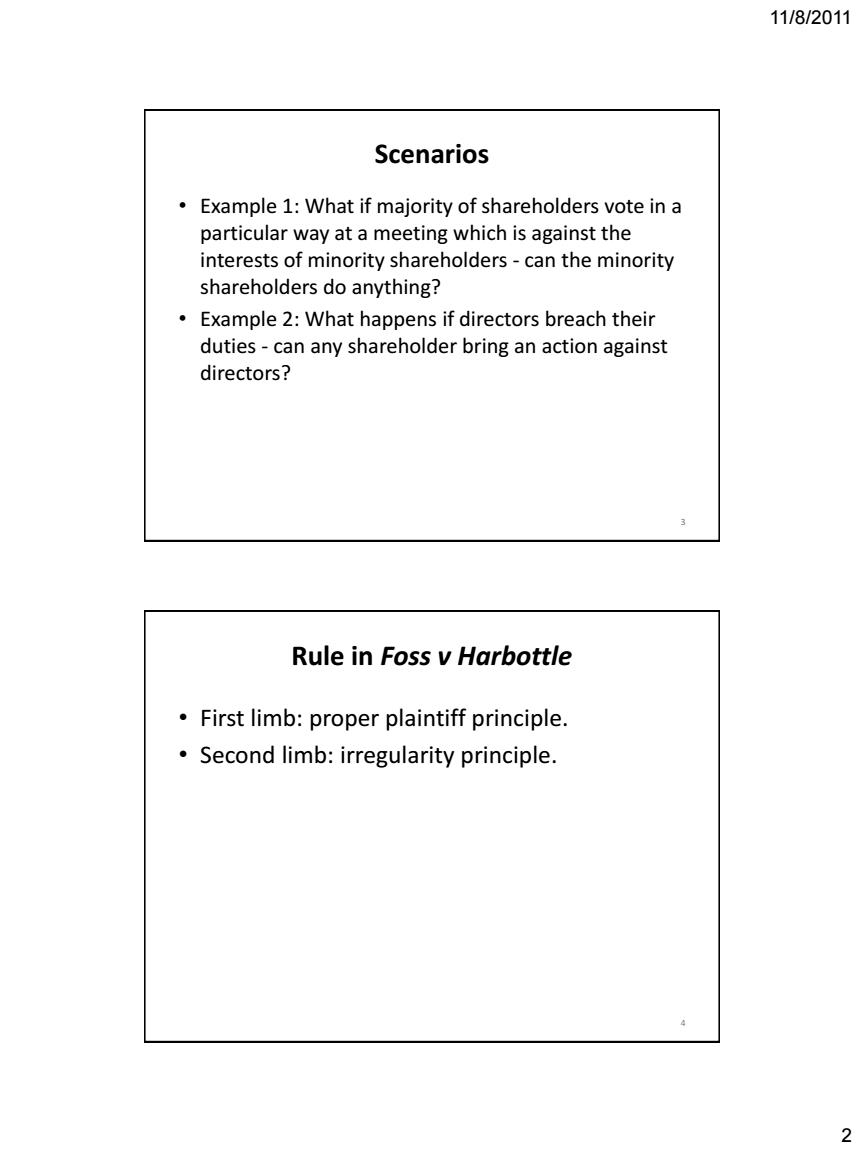
11/8/2011 Scenarios Example 1:What if majority of shareholders vote in a particular way at a meeting which is against the interests of minority shareholders-can the minority shareholders do anything? Example 2:What happens if directors breach their duties-can any shareholder bring an action against directors? Rule in Foss v Harbottle First limb:proper plaintiff principle. Second limb:irregularity principle. 2
11/8/2011 2 3 Scenarios • Example 1: What if majority of shareholders vote in a particular way at a meeting which is against the interests of minority shareholders - can the minority shareholders do anything? • Example 2: What happens if directors breach their duties - can any shareholder bring an action against directors? 4 Rule in Foss v Harbottle • First limb: proper plaintiff principle. • Second limb: irregularity principle

11/8/2011 Corporate wrongs and personal wrongs Distinguish between: Wrongs done to the company (example 2 in slide 3) Company has cause of action Wrongs done to particular shareholders or class of shareholders(example 1 in slide 3). >Shareholder has(personal)cause of action Wrongs to the company Proper plaintiff principle:Foss v Harbottle. Wigram VC:the fact that the general meeting(the"governing body of proprietors")lawfully confirms "the very acts which are the subject of the suit"means that the derivative plaintiffs should be denied to continue the litigation Rule: Underlying rationality What wrong can (or cannot)be ratified?> Wigram's approach: 。Justice? ·“"exceptions”to the rule in Foss v Harbottle 3
11/8/2011 3 5 Corporate wrongs and personal wrongs • Distinguish between: Wrongs done to the company (example 2 in slide 3) → Company has cause of action Wrongs done to particular shareholders or class of shareholders (example 1 in slide 3). → Shareholder has (personal) cause of action 6 Wrongs to the company • Proper plaintiff principle: Foss v Harbottle. Wigram VC: the fact that the general meeting (the “governing body of proprietors”) lawfully confirms “the very acts which are the subject of the suit” means that the derivative plaintiffs should be denied to continue the litigation Rule: Underlying rationality What wrong can (or cannot) be ratified? → Wigram’s approach: Justice? “exceptions” to the rule in Foss v Harbottle
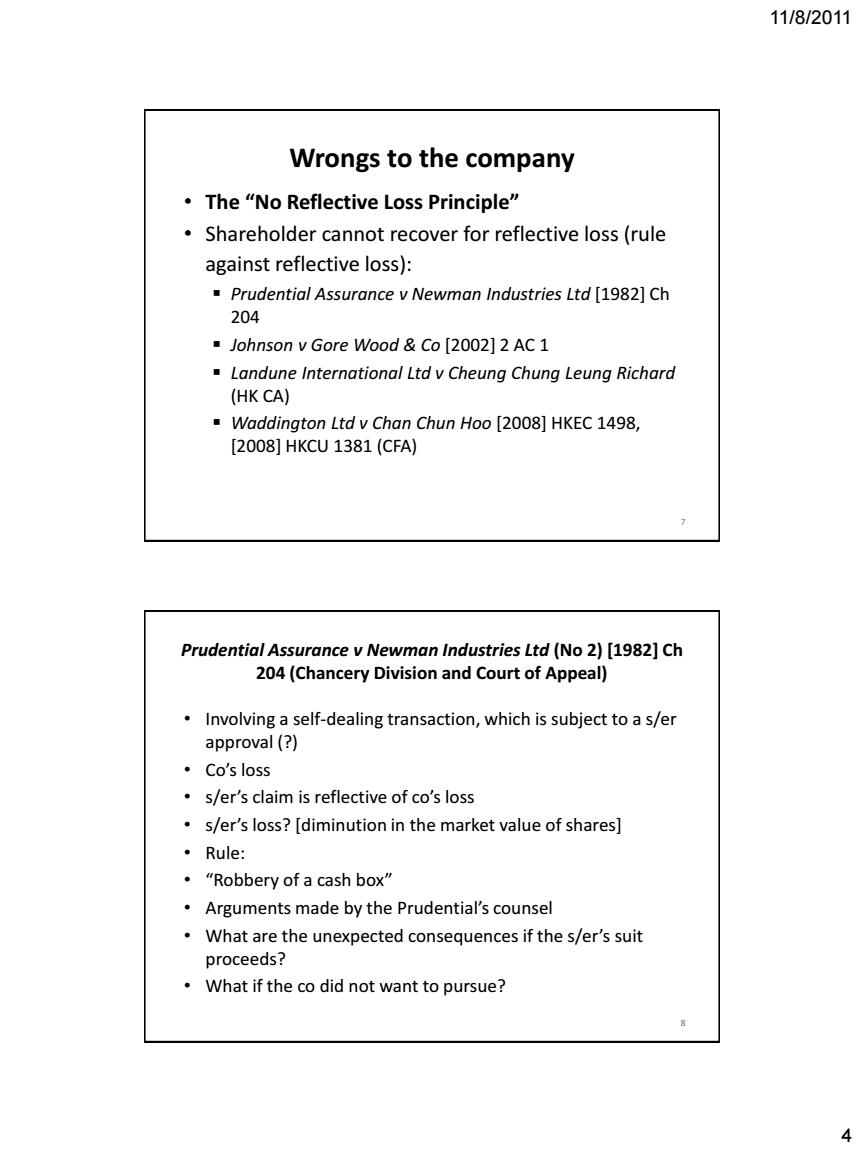
11/8/2011 Wrongs to the company ·The“No Reflective Loss Principle”" Shareholder cannot recover for reflective loss(rule against reflective loss): Prudential Assurance v Newman Industries Ltd [1982]Ch 204 Johnson v Gore Wood Co [2002]2 AC 1 Landune International Ltd v Cheung Chung Leung Richard (HK CA) Waddington Ltd v Chan Chun Hoo [2008]HKEC 1498, [2008]HKCU1381(CFA) Prudential Assurance v Newman Industries Ltd(No 2)[1982]Ch 204(Chancery Division and Court of Appeal) Involving a self-dealing transaction,which is subject to a s/er approval(?) ·Co's loss s/er's claim is reflective of co's loss s/er's loss?[diminution in the market value of shares] ·Rule: "Robbery of a cash box" Arguments made by the Prudential's counsel What are the unexpected consequences if the s/er's suit proceeds? What if the co did not want to pursue? 8 4
11/8/2011 4 7 Wrongs to the company • The “No Reflective Loss Principle” • Shareholder cannot recover for reflective loss (rule against reflective loss): Prudential Assurance v Newman Industries Ltd [1982] Ch 204 Johnson v Gore Wood & Co [2002] 2 AC 1 Landune International Ltd v Cheung Chung Leung Richard (HK CA) Waddington Ltd v Chan Chun Hoo [2008] HKEC 1498, [2008] HKCU 1381 (CFA) 8 Prudential Assurance v Newman Industries Ltd (No 2) [1982] Ch 204 (Chancery Division and Court of Appeal) • Involving a self-dealing transaction, which is subject to a s/er approval (?) • Co’s loss • s/er’s claim is reflective of co’s loss • s/er’s loss? *diminution in the market value of shares+ • Rule: • “Robbery of a cash box” • Arguments made by the Prudential’s counsel • What are the unexpected consequences if the s/er’s suit proceeds? • What if the co did not want to pursue?
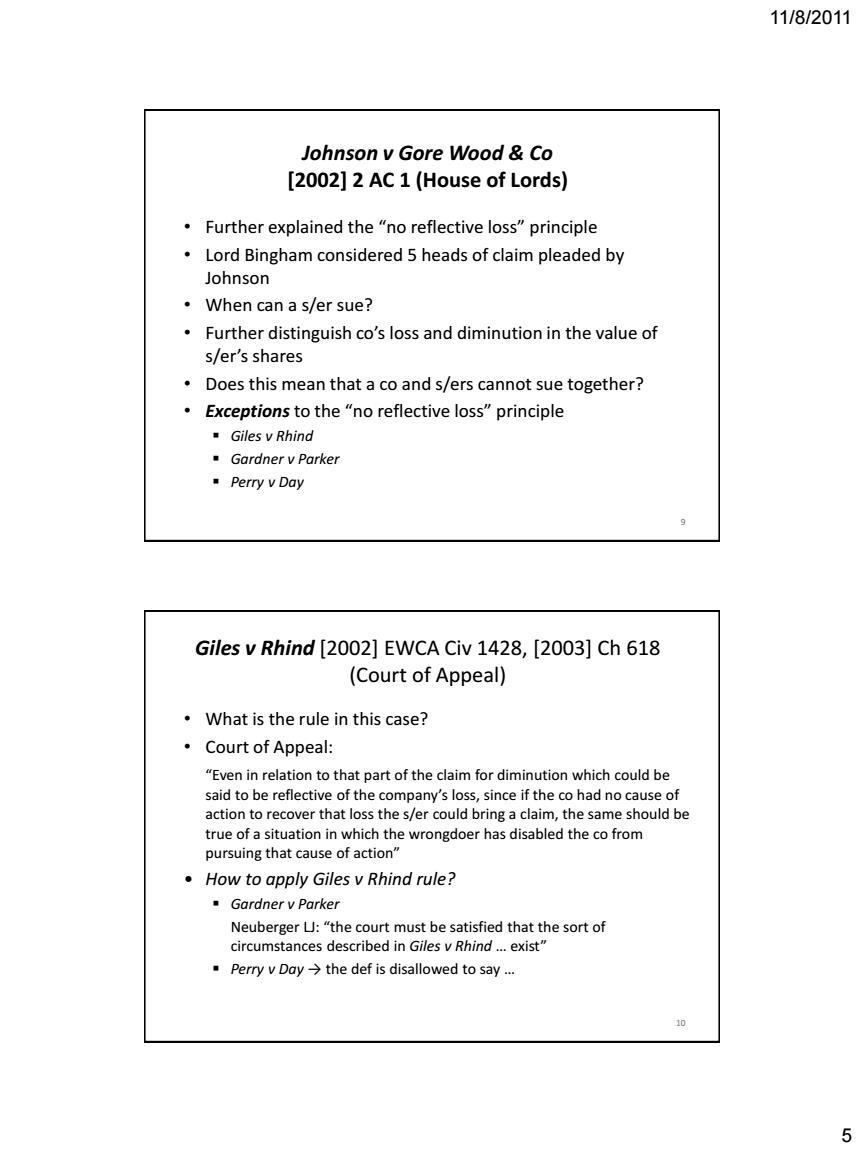
11/8/2011 Johnson v Gore Wood Co [2002]2 AC 1(House of Lords) Further explained the "no reflective loss"principle Lord Bingham considered 5 heads of claim pleaded by Johnson ·When can a s/er sue? Further distinguish co's loss and diminution in the value of s/er's shares Does this mean that a co and s/ers cannot sue together? Exceptions to the "no reflective loss"principle ·Giles v Rhind ·Gardner v Parker ·Perry v Day Giles v Rhind [2002]EWCA Civ 1428,[2003]Ch 618 (Court of Appeal) What is the rule in this case? ·Court of Appeal:: "Even in relation to that part of the claim for diminution which could be said to be reflective of the company's loss,since if the co had no cause of action to recover that loss the s/er could bring a claim,the same should be true of a situation in which the wrongdoer has disabled the co from pursuing that cause of action" How to apply Giles v Rhind rule? ·Gardner v Parker Neuberger U:"the court must be satisfied that the sort of circumstances described in Giles v Rhind...exist" Perry v Day>the def is disallowed to say... 10 6
11/8/2011 5 9 Johnson v Gore Wood & Co [2002] 2 AC 1 (House of Lords) • Further explained the “no reflective loss” principle • Lord Bingham considered 5 heads of claim pleaded by Johnson • When can a s/er sue? • Further distinguish co’s loss and diminution in the value of s/er’s shares • Does this mean that a co and s/ers cannot sue together? • Exceptions to the “no reflective loss” principle Giles v Rhind Gardner v Parker Perry v Day 10 Giles v Rhind [2002] EWCA Civ 1428, [2003] Ch 618 (Court of Appeal) • What is the rule in this case? • Court of Appeal: “Even in relation to that part of the claim for diminution which could be said to be reflective of the company’s loss, since if the co had no cause of action to recover that loss the s/er could bring a claim, the same should be true of a situation in which the wrongdoer has disabled the co from pursuing that cause of action” • How to apply Giles v Rhind rule? Gardner v Parker Neuberger LJ: “the court must be satisfied that the sort of circumstances described in Giles v Rhind … exist” Perry v Day → the def is disallowed to say …
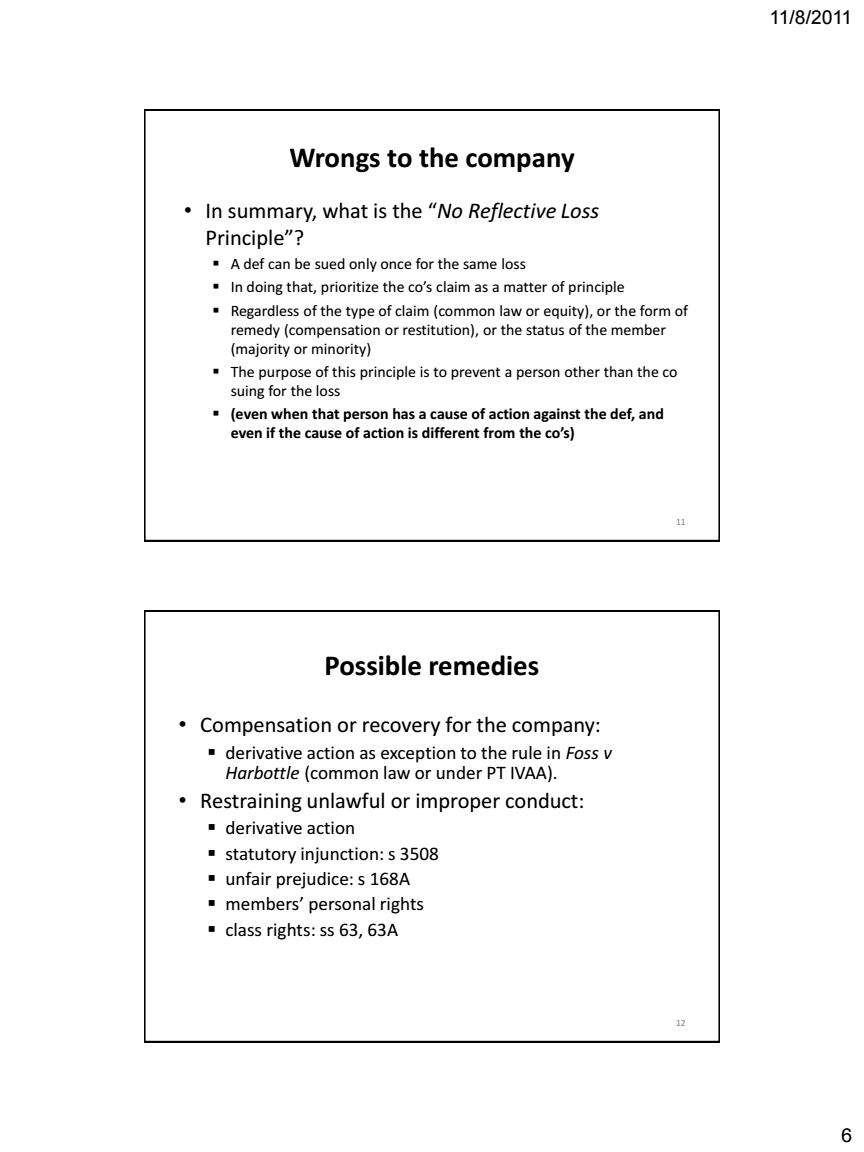
11/8/2011 Wrongs to the company ·In summary,what is the“No Reflective Loss Principle"? A def can be sued only once for the same loss In doing that,prioritize the co's claim as a matter of principle Regardless of the type of claim(common law or equity),or the form of remedy (compensation or restitution),or the status of the member (majority or minority) The purpose of this principle is to prevent a person other than the co suing for the loss (even when that person has a cause of action against the def,and even if the cause of action is different from the co's) 11 Possible remedies Compensation or recovery for the company: derivative action as exception to the rule in Foss v Harbottle(common law or under PT IVAA). Restraining unlawful or improper conduct: derivative action statutory injunction:s 3508 unfair prejudice:s 168A members'personal rights class rights:ss 63,63A 6
11/8/2011 6 11 Wrongs to the company • In summary, what is the “No Reflective Loss Principle”? A def can be sued only once for the same loss In doing that, prioritize the co’s claim as a matter of principle Regardless of the type of claim (common law or equity), or the form of remedy (compensation or restitution), or the status of the member (majority or minority) The purpose of this principle is to prevent a person other than the co suing for the loss (even when that person has a cause of action against the def, and even if the cause of action is different from the co’s) 12 Possible remedies • Compensation or recovery for the company: derivative action as exception to the rule in Foss v Harbottle (common law or under PT IVAA). • Restraining unlawful or improper conduct: derivative action statutory injunction: s 3508 unfair prejudice: s 168A members’ personal rights class rights: ss 63, 63A
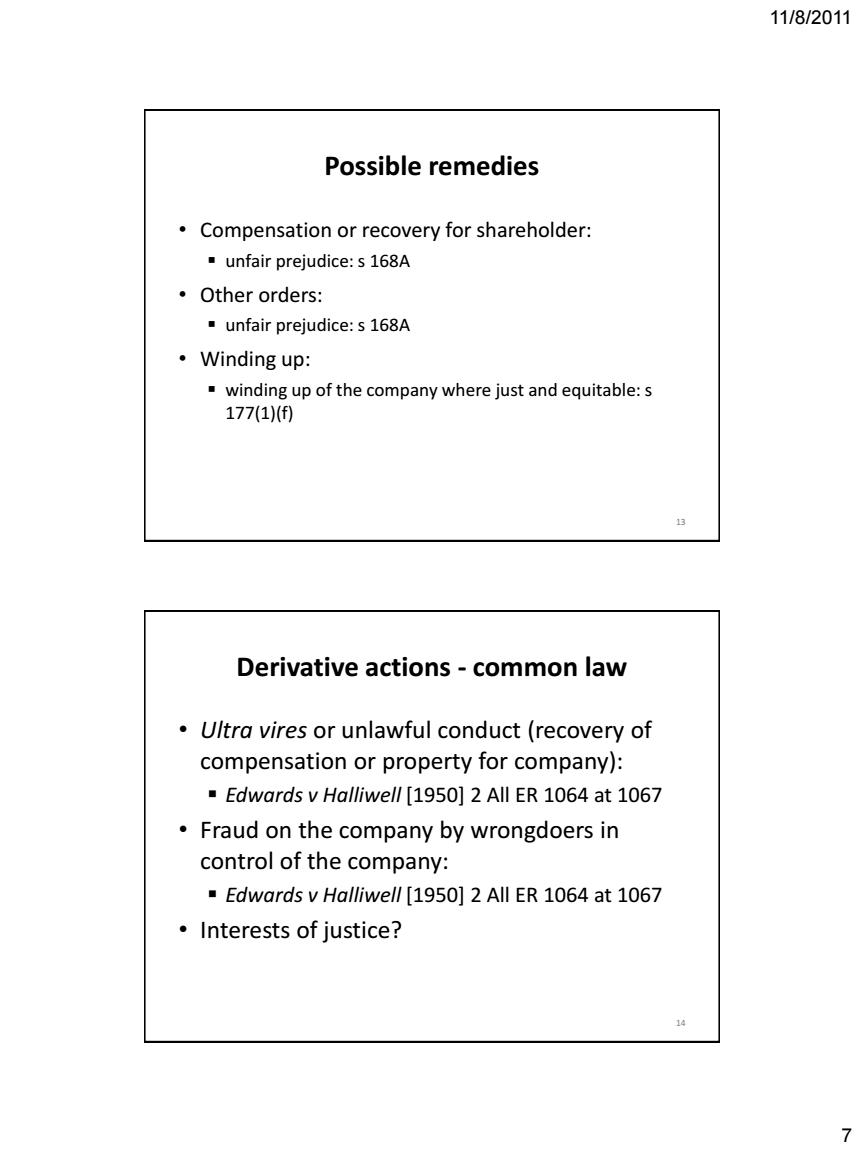
11/8/2011 Possible remedies Compensation or recovery for shareholder: unfair prejudice:s 168A ·Other orders: unfair prejudice:s 168A ·Winding up: winding up of the company where just and equitable:s 177(1)() 13 Derivative actions-common law Ultra vires or unlawful conduct(recovery of compensation or property for company): Edwards v Halliwell [1950]2 All ER 1064 at 1067 Fraud on the company by wrongdoers in control of the company: Edwards v Halliwell [1950]2 All ER 1064 at 1067 Interests of justice? 14 7
11/8/2011 7 13 Possible remedies • Compensation or recovery for shareholder: unfair prejudice: s 168A • Other orders: unfair prejudice: s 168A • Winding up: winding up of the company where just and equitable: s 177(1)(f) 14 Derivative actions - common law • Ultra vires or unlawful conduct (recovery of compensation or property for company): Edwards v Halliwell [1950] 2 All ER 1064 at 1067 • Fraud on the company by wrongdoers in control of the company: Edwards v Halliwell [1950] 2 All ER 1064 at 1067 • Interests of justice?
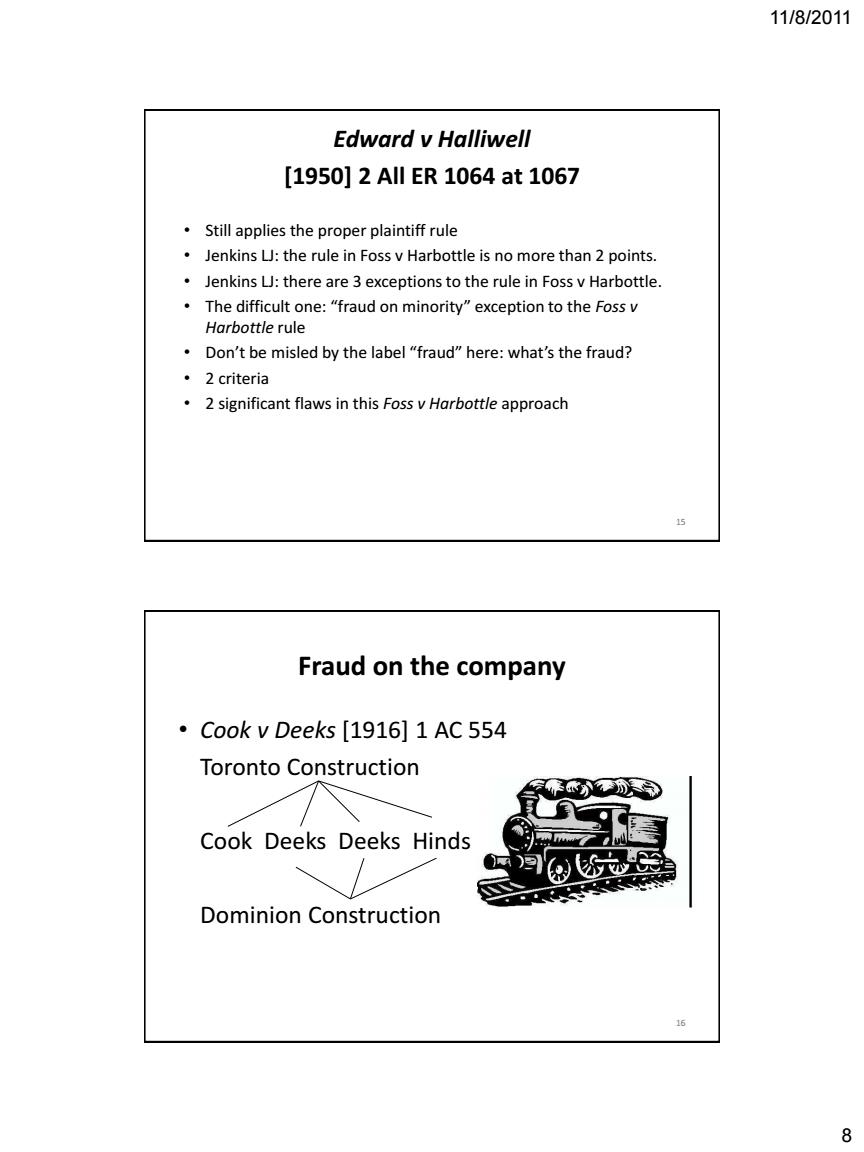
11/8/2011 Edward v Halliwell [1950]2 AIl ER1064at1067 Still applies the proper plaintiff rule Jenkins L:the rule in Foss v Harbottle is no more than 2 points Jenkins L:there are 3 exceptions to the rule in Foss v Harbottle The difficult one:"fraud on minority"exception to the Foss v Harbottle rule Don't be misled by the label "fraud"here:what's the fraud? ·2 criteria 2 significant flaws in this Foss v Harbottle approach 15 Fraud on the company Cook v Deeks [1916]1 AC 554 Toronto Construction Cook Deeks Deeks Hinds Dominion Construction 16 8
11/8/2011 8 15 Edward v Halliwell [1950] 2 All ER 1064 at 1067 • Still applies the proper plaintiff rule • Jenkins LJ: the rule in Foss v Harbottle is no more than 2 points. • Jenkins LJ: there are 3 exceptions to the rule in Foss v Harbottle. • The difficult one: “fraud on minority” exception to the Foss v Harbottle rule • Don’t be misled by the label “fraud” here: what’s the fraud? • 2 criteria • 2 significant flaws in this Foss v Harbottle approach 16 Fraud on the company • Cook v Deeks [1916] 1 AC 554 Toronto Construction Cook Deeks Deeks Hinds Dominion Construction
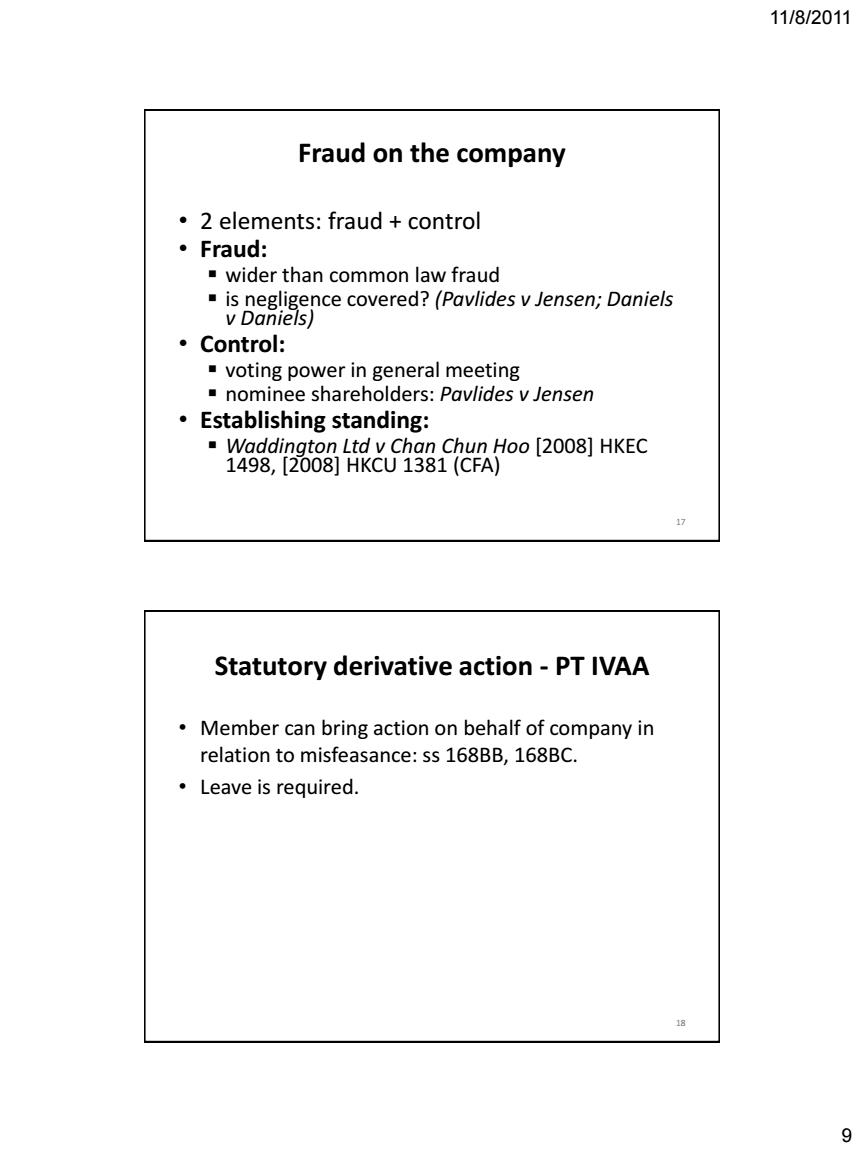
11/8/2011 Fraud on the company 2 elements:fraud control 。Fraud: wider than common law fraud is negligence covered?(Pavlides v Jensen;Daniels v Daniels) ·Control: voting power in general meeting nominee shareholders:Pavlides v Jensen Establishing standing: Waddington Ltd v Chan Chun Hoo [2008]HKEC 1498,[2008]HKCU1381(CFA) 17 Statutory derivative action-PT IVAA Member can bring action on behalf of company in relation to misfeasance:ss 168BB,168BC. 。Leave is required. 18 9
11/8/2011 9 17 • 2 elements: fraud + control • Fraud: wider than common law fraud is negligence covered? (Pavlides v Jensen; Daniels v Daniels) • Control: voting power in general meeting nominee shareholders: Pavlides v Jensen • Establishing standing: Waddington Ltd v Chan Chun Hoo [2008] HKEC 1498, [2008] HKCU 1381 (CFA) Fraud on the company 18 Statutory derivative action - PT IVAA • Member can bring action on behalf of company in relation to misfeasance: ss 168BB, 168BC. • Leave is required
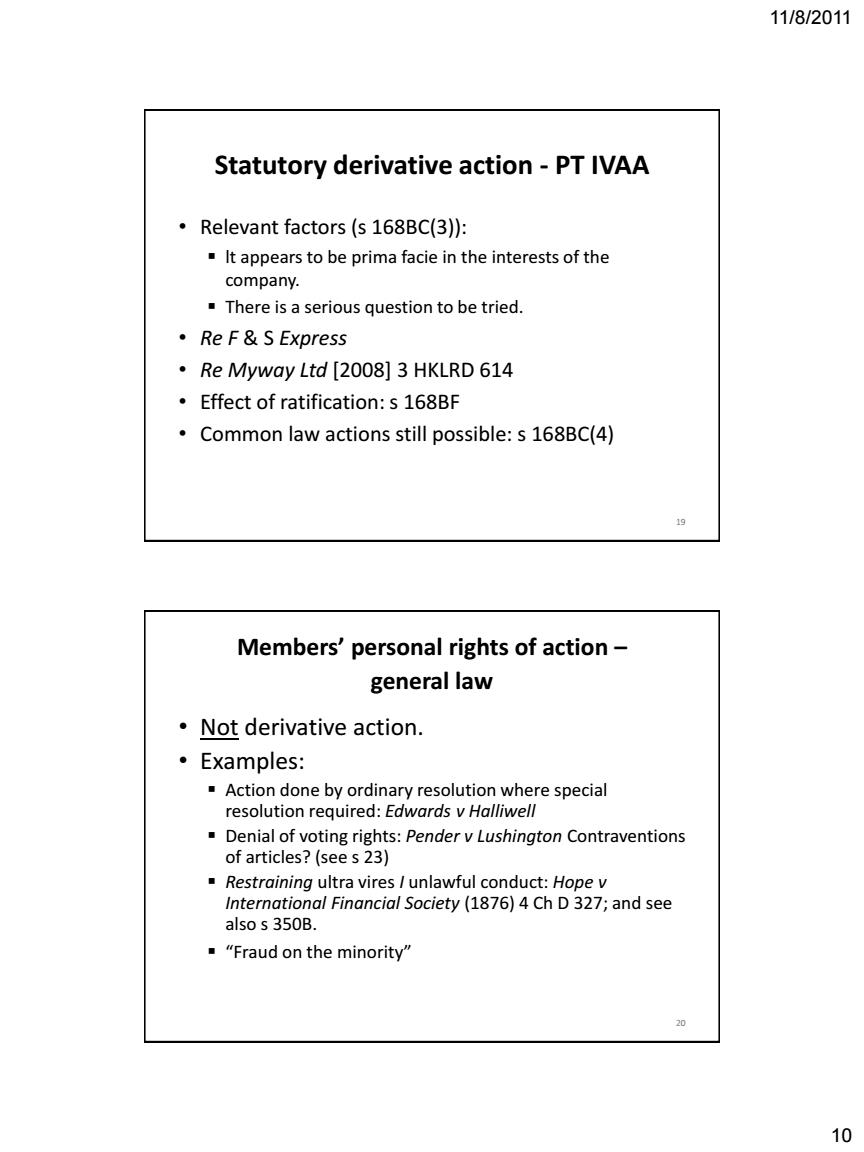
11/8/2011 Statutory derivative action-PT IVAA Relevant factors(s 168BC(3)): It appears to be prima facie in the interests of the company. There is a serious question to be tried. ·ReF&S Express Re Myway Ltd [2008]3 HKLRD 614 Effect of ratification:s 168BF Common law actions still possible:s 168BC(4) 19 Members'personal rights of action- general law Not derivative action. ·Examples: Action done by ordinary resolution where special resolution required:Edwards v Halliwell Denial of voting rights:Pender v Lushington Contraventions of articles?(see s 23) Restraining ultra vires unlawful conduct:Hope v International Financial Society(1876)4 Ch D 327;and see also s 350B. "Fraud on the minority" 10
11/8/2011 10 19 • Relevant factors (s 168BC(3)): lt appears to be prima facie in the interests of the company. There is a serious question to be tried. • Re F & S Express • Re Myway Ltd [2008] 3 HKLRD 614 • Effect of ratification: s 168BF • Common law actions still possible: s 168BC(4) Statutory derivative action - PT IVAA 20 Members’ personal rights of action – general law • Not derivative action. • Examples: Action done by ordinary resolution where special resolution required: Edwards v Halliwell Denial of voting rights: Pender v Lushington Contraventions of articles? (see s 23) Restraining ultra vires I unlawful conduct: Hope v International Financial Society (1876) 4 Ch D 327; and see also s 350B. “Fraud on the minority